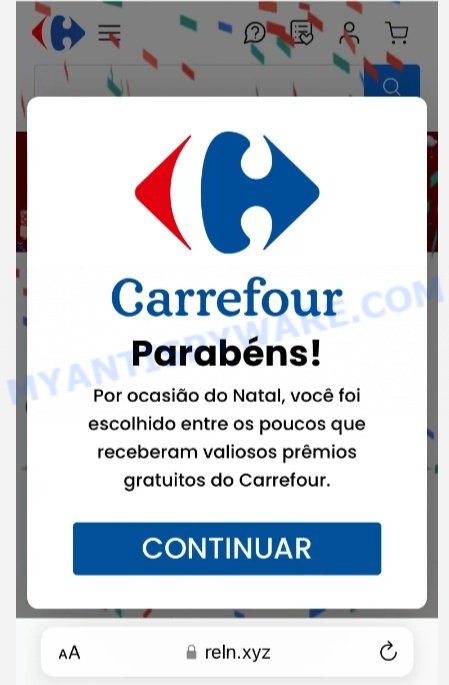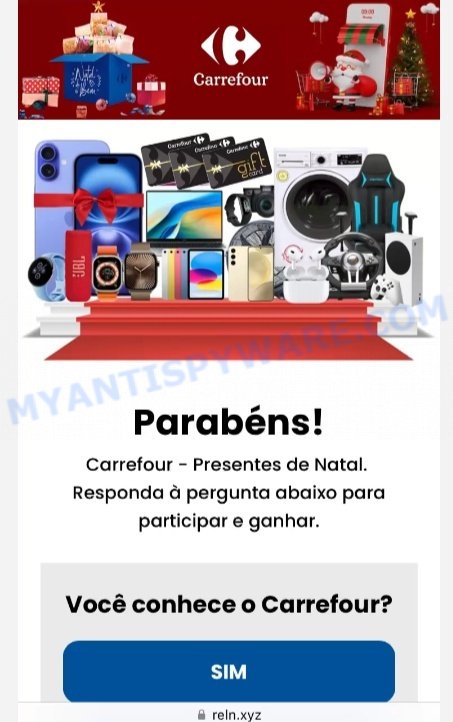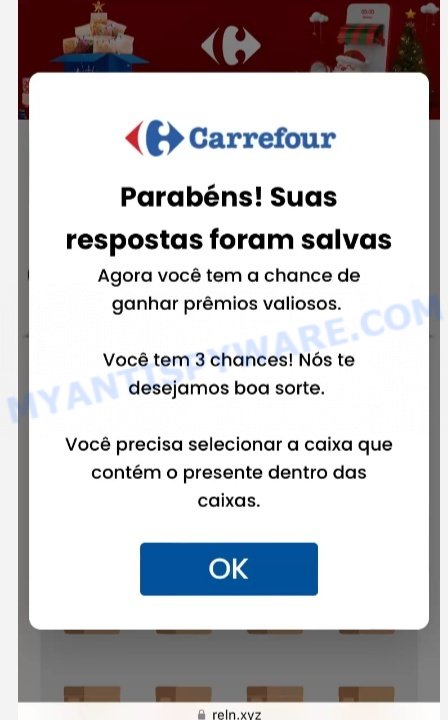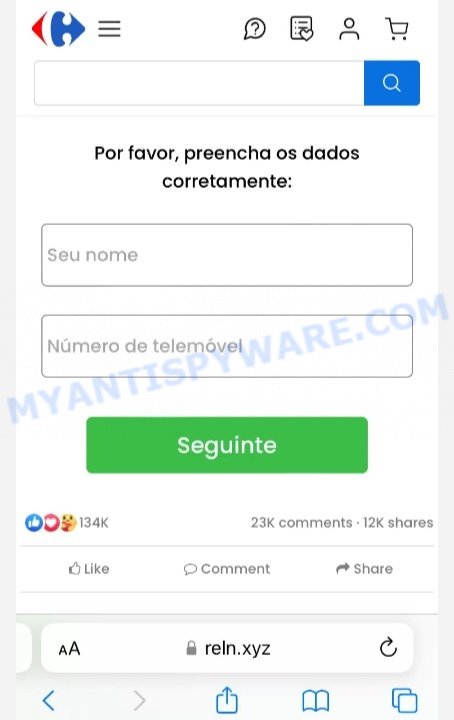Have you come across a message claiming you’re one of the lucky few selected to win amazing free prizes like Apple iPhone 16-256GB from Carrefour for Christmas, especially if it was through WhatsApp?

Question: Is this Carrefour Christmas giveaway real and should you participate to claim the prize?
Investigation Findings: This is a phishing scam pretending to be a giveaway from Carrefour. It tricks people by sending unexpected messages about winning prizes and asks you to spread the word by sharing the message with many friends or groups on WhatsApp. The scam uses a fake site, reln.xyz, which isn’t Carrefour’s official site.
Answer: The Carrefour Christmas Giveaway is a fraudulent scam. 💡 To protect yourself from scams like this, never click on suspicious links or share personal details. Always verify giveaways by checking the company’s official website and think twice about any offer that seems too good to be true. Additionally, be cautious of offers requiring you to share promotional messages with your contacts.
Table of Contents
Understanding the Carrefour Christmas Giveaway Scam on WhatsApp 🛑
The Carrefour Christmas Giveaway Scam is a deceptive scheme that leverages the trust people have in the well-known Carrefour brand. It starts with a message received on WhatsApp, typically appearing to originate from a trusted source. This message entices the recipient with an offer of a free Apple iPhone 16-256GB, including a link that seems legitimate but is actually part of the scam.
Upon clicking the link, the user is directed to a fake website resembling Carrefour’s branding. Here, the scam employs simple yet effective tricks to convince the visitor that they are participating in a genuine giveaway. Participants are asked to complete a short quiz or survey under the guise of winning a prize.
The process is designed to be engaging, giving users the illusion of nearing a reward. Once the quiz is completed, victims are urged to share the scam message with friends or groups on WhatsApp, thus unknowingly aiding the scammers in spreading their net wider.
The final hook comes when users are instructed to enter personal details, such as their name and phone number, under the pretext of claiming their prize. Some versions escalate this by also asking for credit card information to cover supposed delivery charges of the free gift. However, no prizes are ever delivered; instead, victims might risk identity theft, unauthorized charges, or further phishing attacks.
In conclusion, the Carrefour Christmas Giveaway Scam cleverly misuses the Carrefour brand to exploit unsuspecting individuals. It’s crucial to remain vigilant online, scrutinize offers that seem too good to be true, and always verify through official channels before sharing personal information. As scammers grow more sophisticated, our strategies to identify and avoid these traps must also evolve. Trust your instincts and protect your personal details diligently.
Is the Carrefour Christmas Giveaway WhatsApp Message a Virus? 🎄❌
No! The Carrefour Christmas Giveaway message on WhatsApp is not a virus — it cannot infect your phone or corrupt your data by itself. However, it is a part of a sophisticated scam designed to deceive recipients. The message entices users with the offer of a free Apple iPhone 16, leading them to fraudulent websites where they are prompted to enter personal and financial information. Although the message itself isn’t harmful, the links and instructions it contains can lead to risks such as identity theft, financial loss, and potential exposure to actual malware if misleading links are followed or malicious files are downloaded.
💡 Safety Tip: If you receive this or any similar suspicious message, do not click on any links or follow any instructions it contains. Protect yourself by blocking the sender on WhatsApp: open the chat, click on the sender’s name or number, scroll down, and select “Block”. Reporting the message as spam helps WhatsApp identify and reduce scam activities. 🚫📲🔒
Examples of such scams
Scams that exploit the appeal of free items are widespread on the internet, ranging from virtual currency in popular online games to exclusive products associated with well-known brands. Crafted with deceptive intent, these scams lure individuals into fraudulent schemes, leading them to fake websites or compelling them to perform tasks that solely benefit the perpetrators. Victims may end up providing sensitive information or directly losing money to the scammers. The Carrefour Christmas Giveaway Scam is a prominent example of this type of deception. This scam tricks people with the promise of a free “Carrefour Apple iPhone 16”, directing them to participate in quizzes and share the scam with friends, ultimately leading to malicious websites or the extraction of personal details under the guise of claiming a prize. Here, we delve into other infamous scams to illustrate the depth and breadth of these deceptive practices.
Shein $500 Gift Card Scam 🛍️
Fashion e-commerce platform Shein is another brand that has been exploited by scammers. Users receive messages or see posts claiming they can win a $500 gift card to spend on Shein. To “win”, users might be directed to click on questionable links, share the post, or provide sensitive personal information. Such scams not only mislead users with fake promises but also risk compromising their online security.

Mr Beast Giveaway Scam 💸
Mr. Beast, a well-known YouTube philanthropist famous for his lavish giveaways, has unfortunately been impersonated in various online scams. These counterfeit promotions claim that users can win large sums of money or other prizes by performing certain online actions, such as sharing links, providing personal information, or making a small “entry fee” payment. The real Mr. Beast has no connection to these scams, and his official giveaways are always conducted on his verified social media channels.
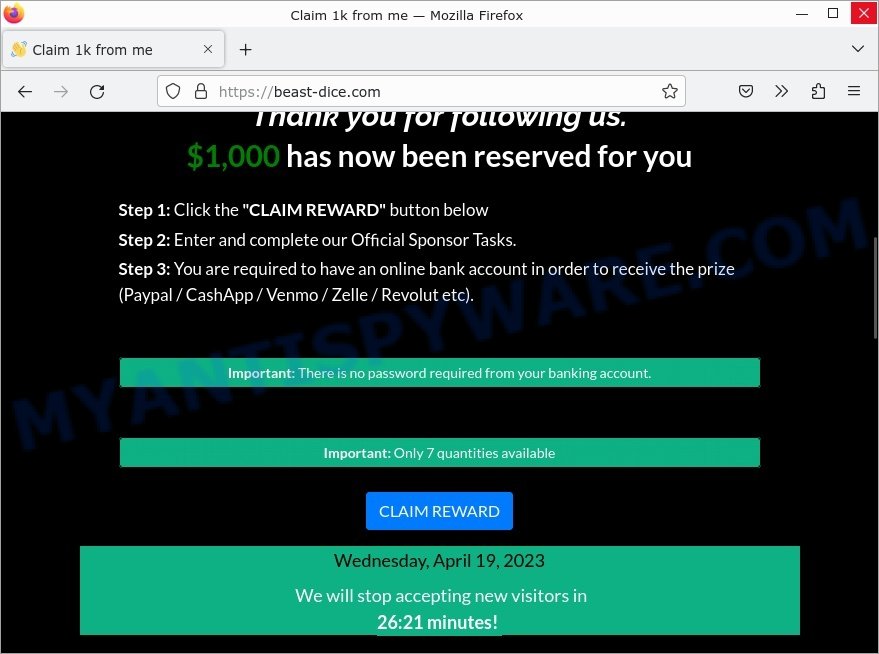
Guy Fieri Pit Boss Scam 🍖
Promising fans a chance to own a free grill from a renowned brand, this scam circulates primarily on Facebook. Users are invited to participate in a giveaway where they stand a chance to win a “Pit Boss” grill endorsed by celebrity chef Guy Fieri. To participate, users are often asked to share the post, tag friends, or click on external links — actions that further propagate the scam or potentially expose the user to malicious software.

These examples emphasize the importance of always verifying the source and being skeptical of offers that seem too good to be true. Cybercriminals continually adapt their tactics, capitalizing on popular names and trends to ensnare unwary individuals. Always exercise caution and conduct due diligence before engaging with online promotions.
What to Do When You Receive the Carrefour Christmas Giveaway WhatsApp Message? 🚫📲
If you receive the Carrefour Christmas Giveaway WhatsApp message, act swiftly to protect yourself and others:
Beware of the Scam 🔍
Understand that the Carrefour Christmas Giveaway message is deceptive. Even if it comes from someone you know, do not click any links. Scammers often spread their traps through contacts.
Alert the Sender 🗣️
If you recognize the sender, inform them through another trusted method like a phone call. They might not realize they are spreading a scam.
Raise Awareness 📢
Educate your friends, family, and social groups about this scam. Stress the importance of not trusting or clicking on unfamiliar links.
Erase the Message 🗑️
In WhatsApp, long-press the scam message, hit delete, and choose to remove it either just for you or for everyone in the chat. This can help prevent its spread.
Notify WhatsApp 📧
Forward the scam message to WhatsApp’s support. Use their official contact methods or email from their website. Your report can help them take action against such frauds.
Took the Bait? Act Fast! ⏳
If you’ve clicked and shared details, monitor your bank and credit statements closely. Update your passwords and alert your banks. Consider placing a fraud alert or freezing your credit. If you’ve lost money, visit What to do if you were scammed for steps on how to seek possible refunds or stop further transactions.
Remember, staying informed and spreading awareness are key to combating scams like the Carrefour Christmas Giveaway WhatsApp scam. By taking these proactive steps, you can protect yourself and others from falling victim to such fraudulent schemes.
Threat Summary
| Name | Carrefour Christmas Giveaway Scam, “Carrefour scam”, “Carrefour Christmas Apple iPhone scam”, “Christmas Apple iPhone 16 scam” |
| Type | Phishing Scam |
| Disguise | Masquerades as a giveaway from the well-known Carrefour brand to appear legitimate. |
| Fake claims | Claims to offer a free Apple iPhone 16-256GB as part of a limited giveaway. |
| Damage | Potential financial loss, identity theft, unauthorized charges, risk of malware infections. |
| Indicators of the Scam | Use of unofficial URLs, requests for personal information, instructions to share the offer with contacts on WhatsApp. |
| Distribution methods | Distributed via WhatsApp messages, encourages users to share the scam with friends and family. |
| Scam Websites | Examples include reln.xyz. |
| Prevention Tips | Verify giveaways through official sites, be cautious of sharing personal information, avoid clicking on suspicious links. |
| Reporting Info | Report suspicious messages to official Carrefour contact points or through anti-phishing groups. |
What to do if you were scammed 🚫🔐
If you’ve been caught up in the Carrefour Christmas Giveaway Scam, don’t panic. It’s important to act quickly to protect yourself and your finances.

🏦 Contact Your Financial Institution:
Immediately inform your bank or credit card company about the unauthorized transaction. They may be able to stop the transaction, reverse it, or even issue a chargeback. Request a new credit/debit card if you believe your card details have been compromised. Document any financial losses. This can be essential for investigations and potential reimbursements.
🔐 Change Passwords:
If you suspect your personal information, especially passwords, have been compromised, change them immediately. This is crucial for accounts linked to financial institutions or personal data. Consider using a reputable password manager to ensure strong, unique passwords for each account.
👀 Monitor Your Accounts:
Keep a close eye on your bank and credit card statements for the next several months. Look for any unauthorized or suspicious transactions, no matter how small. Consider enrolling in a credit monitoring service. Some services will alert you to changes in your credit report, potentially indicating identity theft.
🚔 Report the Scam
Forward the scam email to the Federal Trade Commission (FTC) at spam@uce.gov. Report the scam to your local law enforcement and provide them with all the details and evidence you have.
💻 Scan Your Device For Malware
If you’ve downloaded any attachments or clicked on any links in the scam message, your device might be infected. Run a comprehensive antivirus scan. Consider consulting with a professional to ensure your device is clean from malware or spyware.
📘 Educate Yourself
Familiarize yourself with common scam tactics to avoid falling victim in the future. Stay updated on recent scams or phishing methods by following news sources or official government warnings.
📢 Inform Others
Warn friends and family about the scam, especially if it’s widespread. Sharing your experience can help protect others from the same pitfalls.
Conclusion
The Carrefour Christmas Giveaway scam on WhatsApp is a deliberate attempt by scammers to exploit the festive season, targeting unsuspecting users with offers of free chocolate baskets. The scam, presenting itself as a limited-time offer, uses a series of deceptive web pages to appear legitimate and enticing. Participants are led through steps that involve sharing the scam with friends, entering personal information, and following misleading instructions which could lead to further malicious activities.
Although the initial message may seem harmless, its true danger lies in the way it encourages victims to spread the scam quickly and widely. What to do? Don’t click on any links, delete the message, block the sender, and tell your friends and family to be cautious of such scams. Staying alert and well-informed is your best defense. 🛡️🚫🔍
